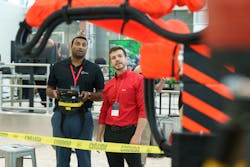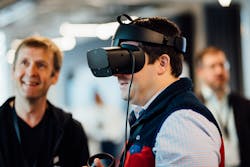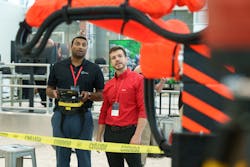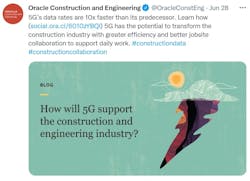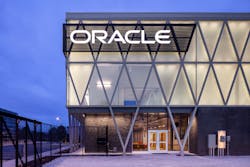By BURCIN KAPLANOGLU, PhD, Vice President, Innovation, Oracle Industry Lab
Special to HPAC Engineering
There has never been more pressure for the construction and engineering industry to continue its digitization efforts as it confronts the continued disruptions of COVID-19, shifting project types, increased competition, and a retiring labor force.
- Sign up for our May 9, 2024, webinar, "A.I., Drones, Digital Twins, and You!"
These many challenges now have the industry rethinking every aspect of project delivery models and the vital role technology can play to improve outcomes while driving down risk and costs.
Owners, engineers, and contractors we meet are continually looking for any advantage possible when determining the latest and greatest technologies for their projects. They would like to be able to research and test new technologies prior to purchasing the solutions that they hope will become the foundation for the success of their future business.
With that in mind, Oracle recently opened the doors to the 30,000-sq-ft Oracle Industry Lab near Chicago earlier this year. The new working Lab, now one of three such facilities Oracle operates globally, gives customers a hands-on environment to develop new ideas and utilize modern technologies from Oracle and from more than 30 of our industry partners.
One of those industry partners is VREX, a leading provider of virtual reality (VR) collaboration software for the construction industry. Together, we have integrated VREX into the Oracle Smart Construction Platform, a secure cloud-based software that connects owners and contractors so they can more easily work together to improve decision-making at every level of their organizations.
For example, teams can use Oculus VR headsets to virtually collaborate inside a 3D model or point cloud to identify potential issues in an HVAC installation or other systems. Since delays and mistakes in a construction project are often due to unclear communication between individuals, this integration can give anyone who needs to make an informed opinion first-hand experience of project models.
Additionally, we also recently worked with Hilti’s Jaibot, a robotic solution designed to take on the tedious and sometimes unsafe task of drilling holes in concrete while also collecting and communicating valuable data as it progresses. The solution's semi-automated drilling technology helps work teams be more productive to more precisely and safely install the hangars needed to suspend HVAC ducts and other conduits. Using digital plans, the Jaibot can mark and drill holes, relieving site workers from the arduous task of overhead drilling.
With the Chicago area Lab now open, our focus is on working with customers and partners to assess new technologies, and together, we are thinking about the future of construction innovation this year and beyond. Here are four technologies we think will lead the pack:
5G will truly connect the worksite
Greater mobility and the advancements in connectivity brought about by 5G will further accentuate the industry’s ability to utilize insights provided through common data environments (CDE), the sensorization of jobsites and materials, augmented reality (AR), artificial intelligence (AI), and machine learning (ML).
These technologies will provide greater connectivity, capacity, and democratization of technology.
Eventually, work sites could be able to "sensorize" virtually everything on a job site, enabling companies to collect data from tools and materials. For example, workers could put sensors in concrete to assess curing time. Capturing such crucial information from IoT sensors can make 5G a crucial component of a job site.
Additionally, 5G will further heighten the focus on visualization and enable experts to provide real-time guidance to new technicians connected via headsets, glasses, or other visualization technologies.
As 5G becomes more accessible, it could open up new capabilities for monitoring, laser scanning, BIM modeling, and much more.
'Construction Moneyball' will be a hit
Construction industry executives and operators are realizing they must standardize, digitalize, and automate their processes to differentiate themselves in the market. So, we expect organizations will begin to take a ‘Construction Moneyball’ approach where they will analyze everything meaningful that can possibly be measured.
After determining the data or metrics they need to capture and monitor, organizations would be able to standardize, digitalize, and automate their processes to measure and analyze this data in real-time. The results may be surprising in revealing what really holds the keys to success. Recall for the Oakland A’s in Moneyball, the data surprisingly showed the risks of bunting and stealing didn’t always add up to the reward of getting in a run. For construction firms, similarly, maybe one overlooked aspect of daily operations could be the linchpin factor that routinely throws off an entire project.
With standardized business processes, constantly pulling and analyzing data, firms will be able to drive productivity and efficiencies to better compete, to differentiate themselves, and to stay ahead. Quick data intelligence can also help identify and resolve data security issues faster. This alone could become a growing competitive advantage in the coming years as customers will want reassurance that their data will be kept safe.
Intelligent platforms will transform everything
As noted, engineering and construction organizations will look to improve how data is managed – and how it is used to inform decision-making. With hundreds of decisions all happening at once on a project, organizations will utilize construction technology platforms to better keep everyone synchronized, and to provide the project team the visibility, tracking, and reporting it needs to stay on track.
As contractors and engineers increasingly move towards more digital workflows, a new breed of intelligent technology platforms, powered by an AI and ML “data backbone,” will emerge. These platforms could help organizations liberate their data and convert it into the intelligence needed to accelerate performance.
They may also provide highly secure information management, reporting, and workflow automation to drive efficiency, visibility, and control across project processes. These cloud-based intelligent construction platforms would support a new era of construction performance needed to compete in an increasingly competitive market.
Predictive AI will be the future of planning
To date, business intelligence technologies have generally provided only a backward-looking view into project data, i.e., what has happened on projects. While these insights are valuable, organizations will soon look to construction technology platforms that utilize AI to predict what is likely to happen throughout the construction process. This will improve chances for delivering a project on time and on budget.
New developments in AI already have unlocked another level of project intelligence, enabling predictive insights to drive better decision-making and improve project outcomes. Taken together, they can yield a dynamic view into such variables as:
- Factors that might delay a project;
- Probability of delay on a project;
- Amount of predicted delay;
- Likelihood (and severity) of a cost overrun;
- Hidden risks around safety, design, rework, litigation, etc.
AI will help organizations succeed in the present, by learning from the past, to improve the future. It will yield predictive insights that add value to nearly every aspect of construction project management, including critical areas such as schedule, cost/budget, quality, safety, risk, and collaboration.
Of course, all these technologies and use cases driving safety, productivity, and quality will need to be tested before being deployed in the field. We created Oracle Industry Lab as a test bed specifically for this purpose. The Lab allows Oracle, customers, partners and their ecosystem, to explore, test, validate technologies, improve processes, and enhance skills of the future workforce.
And the results will help to accelerate and to fine-tune the myriad changes that are transforming our industry, both sooner and for the better.
##########
Author Burcin Kaplanoglu is Vice President of Innovation at the Oracle Industry Lab in Deerfield IL, outside Chicago. He also serves as an adjunct professor at Northwestern University and chairs an advisory committee to the A.I. in Construction Institute at the Grainger College of Engineering, University of Illinois, Urbana-Champaign. Kaplanoglu previously spent 15 years with Lendlease, and holds multiple degrees in civil engineering and construction management. He can be reached at [email protected].
About the Author
Burcin Kaplanoglu
Burcin Kaplanoglu, PhD | Head of Oracle Industry Labs
Dr. Kaplanoglu is a recognized industry technologist, innovator, thought leader, and keynote speaker. He is co-founder and head of the Oracle Industry Innovation Labs, which support Oracle Vertical Industries, offering solutions for Construction and Engineering, Energy and Water, Communications, Food and Beverage, Banking and Insurance Services, Healthcare, Life Sciences, Hospitality, Retail, and the Public Sector.
A technology influencer, Dr. Kaplanoglu has been recognized by LinkedIn as one of its Top Voices for sharing developments in AI, robotics, 5G, and other emerging technologies. Last year, alone, his LinkedIn posts were viewed over 21 million times. Today, he is Chair of the Board Committee at the Institute for AI in Construction, funded by the National Science Foundation (NSF) and Discovery Partners Institute (DPI).
In 2022, Dr. Kaplanoglu received the prestigious James B. Porter Award for Technology Leadership by the Construction Industry Institute (CII) in recognition of his contributions, innovation and dedication to the construction and engineering industry. That same year, he was also named as one of Engineering News Record’s Top 25 Newsmakers.
- Listen to Dr. Kaplanoglu's 2022 appearance on HPAC 'On The Air' here.
He was acknowledged as one of the “BuiltWorlds 2020 Mavericks” in the Technologists category, and as one of the 7 “AEC Innovators” by BD+C magazine. He received the Oracle Construction and Engineering “Let’s Build” award in 2020, and was an adjunct professor at Northwestern University's McCormick School of Engineering for over a decade.
Previously, Dr. Kaplanoglu served as VP, director of operations at Lendlease’s telecommunication’s infrastructure business unit, where he was responsible for innovation, strategy, and operations. During his 16 years at Lendlease, he led construction projects, spearheaded national real estate development programs, developed corporate operational systems, and initiated process improvements to operations. He frequently speaks and publishes articles related to the corporate innovation, Internet of Things, disruption of tech, investments, and construction technology, the next generation of wireless communication (5G), and innovation leadership.
Oracle Industry Lab: https://www.oracle.com/innovation/
Burcin Kaplanoglu:
- LinkedIn: https://www.linkedin.com/in/burcinkaplanoglu/
- Twitter: https://twitter.com/burcintech
Oracle Construction and Engineering:
